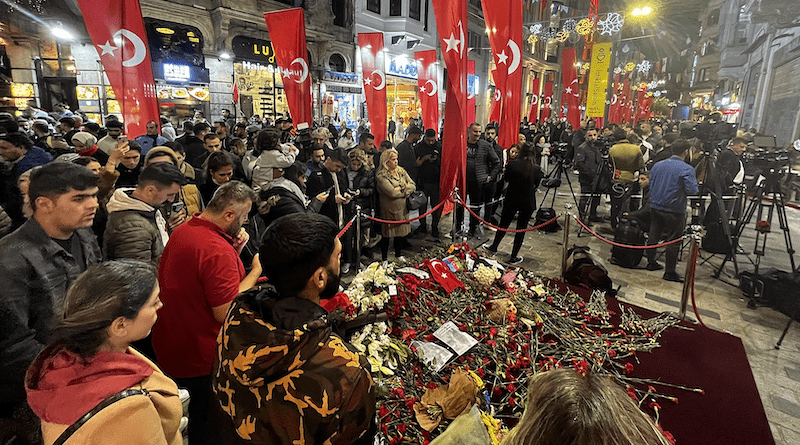Turkey Says PKK’s Syrian Offshoot Behind Bloody Istanbul Attack
By Arab News
By Menekse Tokyay
In an overnight raid, Istanbul police detained a 23-year-old Syrian woman, Ahlam Al-Bashir, as the prime suspect for having planted the bomb that killed six people and wounded 81 people in the city on Sunday.
Turkish Interior Minister Suleyman Soylu announced that the outlawed Kurdistan Workers’ Party, or PKK, and its Syrian offshoot the Democratic Union Party, or PYD, were behind Sunday’s blast in Istiklal Avenue, targeting civilians.
In a statement published by the Fırat news agency, the PKK denied any involvement in the attack, but Turkish intelligence sources insist on the high probability of the group’s role in it.
Al-Bashir confessed she was trained by Kurdish militants in Syria and entered Turkiye illegally through Syria’s northwestern Afrin region, currently controlled by Turkish troops.
She was caught in the CCTV footage, wearing a hijab and camouflage, when leaving the area with a remotely controlled bomb-loaded bag.
Among the victims of the attack were a 3-year-old girl and her father, an employee at the Ministry of Family and Social Services’ branch in the southern province of Adana. They were vacationing in Istanbul.
The White House released a press statement, in which it said that the US “strongly condemns the act of violence” and reiterated that it “(stands) shoulder-to-shoulder with its NATO ally Turkiye in countering terrorism.”
Soylu, however, openly criticized the US for giving support to Kurdish militants in Syria, saying “the insincerity of our allies who officially send money is obvious” and comparing the condolences to the arrival of the murderer at the crime scene.
Security analysts insist that there was a PKK connection to the attack, based on patterns observed in previous attacks.
“This time, the PKK appears to be targeting civilians in a crowded spot in a metropolis in order to generate a wider impact on public opinion and attract more attention ahead of the elections set for next year,” Erol Bural, a retired colonel and head of the Ankara-based Research Center for Combating Terrorism and Radicalization, told Arab News.
“The ongoing anti-terror operations of Turkiye seriously weakened the PKK’s military clout within the country and in its region, which also undermined the organizational capabilities of the group as well as its popular support. The only way to regain it was through terrorism, a bomb attack, to punish Turkiye,” he said.
According to Bural, the PKK uses this pattern against civilians to instill fear and as a reminder that it still poses a threat and can repeat such acts.
Turkiye considers the People’s Protection Units, or YPG, and PYD as linked to the PKK, an armed group listed as a terror organization by the US, EU and Turkey.
Turkiye carried out three operations in northern Syria against the YPG, while another operation was expected this year but never realized.
The PKK has fought an almost four-decades-long armed insurgency against the Turkish state, claiming the lives of over 40,000 people. The group has several members exiled in Sweden.
As part of the newly established consensus between Turkiye and Sweden to give the Scandinavian country’s NATO accession bid a green light, Sweden’s foreign minister in the new government recently said Stockholm needed to “distance” itself from the YPG and PYD, who control much of northern Syria.
“There is too close a link between these organizations and the PKK,” Foreign Minister Tobias Billstrom recently told broadcaster Sveriges Radio.
Swedish Prime Minister Ulf Kristersson recently visited Ankara to discuss the details of its entry into NATO.
Bural believes that the latest Istanbul attack may also carry a threatening message toward European countries, implying that similar acts may happen in their countries as well if they ever restrict the PKK’s presence and its propaganda activities.
“From now on, the PKK may conduct its terror acts in big cities using its networks and proxies inside Turkiye or by deploying foreign fighters from abroad.
“In both cases, Turkiye needs to tighten its border security and take additional precautions against potential cells within the country.
“Each year, about 200 terror acts of various groups are prevented in Turkiye, but one of them escapes from the security radar and claims so many innocent lives,” Bural said.
While the PKK is seen as a top suspect in the blast, experts also draw attention to the Iranian factor in such acts of terrorism in Turkey, considering the recent disagreements between the two countries.
On July 22, Kataib Seyid el-Suheda, an Iranian-backed militia group in Iraq, shared a photo from Taksim square in Istanbul, with the slogan “Wherever we need to be, we will be there.”
The same account posted another video on July 24.
“Our eyes are on Istanbul. People loyal to Abu Alaa El-Vali,” the message in it said, referring to the leader of the Iranian-backed militia group, “are at the heart of Turkiye, just (as) they were yesterday.”
Just hours before the Istanbul attack, a controversial Iranian article also blamed Turkish intelligence chief Hakan Fidan for playing a role in the terror attack on a Shiite religious shrine in the Iranian city of Shiraz on Oct. 22, which killed 15 people, and for promoting Azerbaijani separatism.
Daesh claimed responsibility for that attack.
Pro-Iran Shiite militia groups have been previously accused of being behind rocket attacks against a Turkish base north of Iraq’s Mosul following Turkish airstrikes that targeted the PKK there.
Turkiye launched several cross-border military operations into Syria and northern Iraq against the PKK’s hideouts following the increase in bloody terror attacks between 2015 and 2017, which killed hundreds of civilians and security personnel.

